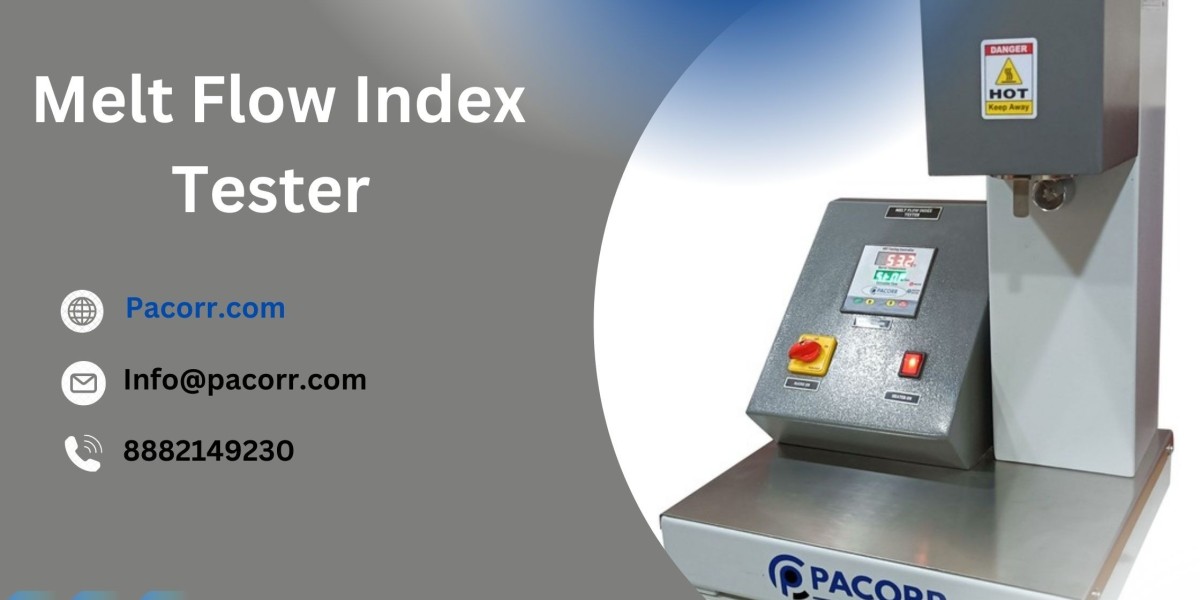What is Melt Flow Index (MFI)?
The Melt Flow Index (MFI) is a measure of the ease of flow of the melt of a thermoplastic polymer. It is a crucial parameter that indicates the viscosity of the polymer in its molten state. MFI is expressed in grams per 10 minutes and is determined by measuring the amount of polymer that flows through a capillary of specific dimensions under a defined load and temperature.
Why is MFI Important?
Quality Control: Melt Flow Index Testing helps in maintaining consistent quality in polymer production. By regularly measuring MFI, manufacturers can ensure that the polymer’s properties remain within specified limits.
Process Optimization: Knowing the MFI of a polymer helps in optimizing processing conditions such as temperature and pressure in extrusion and melding operations. This leads to efficient production and minimizes defects.
Material Selection: MFI provides valuable information for selecting the appropriate polymer grade for specific applications. Different applications require polymers with different flow characteristics, and MFI testing ensures the right match.
Predicting Performance: MFI can be an indicator of a polymer’s performance in its end-use application. For instance, a high MFI indicates lower molecular weight and higher fluidity, which might be suitable for thin-walled products, whereas a low MFI suggests higher molecular weight and better mechanical properties.
Pacorr's Melt Flow Index Testers
At Pacorr, we understand the critical role MFI testing plays in the polymer industry. Our Melt Flow Teste are designed with precision and reliability in mind. Here are some features that set our testers apart:
Accurate Measurements: Our testers provide highly accurate and repeatable measurements, ensuring you get reliable data every time.
User-Friendly Interface: With intuitive controls and a clear display, our testers are easy to use, minimizing training time and errors.
Robust Construction: Built with high-quality materials, our testers are durable and can withstand the rigors of a busy manufacturing environment.
Versatile Testing: Our equipment can handle a wide range of polymers, making it a versatile addition to any laboratory.
How to Use Pacorr's Melt Flow Index Tester
Using Pacorr's Melt Flow Index Tester Price is straightforward. Here’s a quick guide:
Prepare the Sample: Cut a small piece of the polymer and condition it according to the standard procedures.
Set the Parameters: Input the required test parameters, including temperature and load, on the tester’s control panel.
Conduct the Test: Place the sample in the tester, apply the load, and start the test. The polymer will melt and flow through the capillary.
Record the Results: The amount of polymer that flows through the capillary is measured and recorded. This value is used to calculate the MFI.
Conclusion
Melt Flow Index testing is an essential part of polymer manufacturing, providing critical data for quality control, process optimization, material selection, and performance prediction. Pacorr’s Melt Flow Index Tester are designed to deliver accurate, reliable, and repeatable results, helping manufacturers maintain the highest standards of quality. Trust Pacorr to provide the tools you need to ensure your materials perform as expected, every time.
Visit Pacorr.com today to learn more about our Melt Flow Index Testers and how they can benefit your manufacturing process.
Frequently Asked Questions (FAQ)
1. What is a Melt Flow Index (MFI) Tester?
A Melt Flow Index (MFI) Tester is a device used to measure the flow rate of melted thermoplastic polymer materials. It helps determine the viscosity of the polymer by measuring the amount of material that flows through a capillary under a specified temperature and load over a set period, typically 10 minutes.
2. Why is MFI testing important?
Melt Flow Index Testing is crucial for quality control in polymer manufacturing. It helps ensure consistent material properties, optimizes processing conditions, aids in selecting the appropriate polymer grade for different applications, and predicts the performance of the polymer in end-use applications.
3. How does Pacorr's MFI Tester differ from others on the market?
Pacorr's MFI Testers are known for their accuracy, reliability, and user-friendly interface. They are built with high-quality materials for durability and can handle a wide range of polymers, making them versatile for various applications.
4. What parameters are set during an MFI test?
During an Melt Flow Teste, the temperature and load are the primary parameters that need to be set. These parameters vary depending on the type of polymer being tested and the standards being followed (e.g., ASTM D1238 or ISO 1133).
5. How do you prepare a sample for MFI testing?
To prepare a sample for MFI testing, cut a small piece of the polymer and condition it according to standard procedures, which may involve preheating or other preparatory steps. The sample is then placed into the MFI tester for measurement.
6. Can Pacorr's MFI Testers handle all types of polymers?
Yes, Pacorr's MFI Testers are designed to handle a wide range of thermoplastic polymers. They are versatile and can be used for testing various types of materials with different melt flow properties.
7. How often should MFI testing be conducted in a manufacturing process?
The frequency of Melt Flow Index Tester Price depends on the specific requirements of the manufacturing process and the consistency needed in the final product. Regular testing is recommended to ensure continuous quality control and process optimization.
8. What standards do Pacorr's MFI Testers comply with?
Pacorr's MFI Testers comply with international standards such as ASTM D1238 and ISO 1133. These standards specify the method for determining the melt flow rates of thermoplastic materials.
9. How do I interpret the results of an MFI test?
The results of an MFI test are expressed in grams per 10 minutes (g/10 min). A higher MFI indicates a lower molecular weight and higher flow rate, while a lower MFI suggests a higher molecular weight and lower flow rate. The appropriate MFI value depends on the intended application of the polymer.
10. Where can I purchase Pacorr's Melt Flow Index Testers?
Pacorr's Melt Flow Index Tester can be purchased directly from our website at Pacorr.com. For further inquiries or to request a quote, you can contact our sales team via the website.
11. Do you provide technical support and training for using the MFI Tester?
Yes, Pacorr provides comprehensive technical support and training for using our MFI Testers. Our team is available to assist with installation, calibration, and any operational questions you may have to ensure you get the most out of your equipment.
12. What maintenance is required for Pacorr's MFI Testers?
Regular maintenance of Pacorr's MFI Testers involves cleaning the capillary and piston, checking for any wear or damage, and ensuring the equipment is calibrated correctly. Detailed maintenance guidelines are provided in the user manual.








